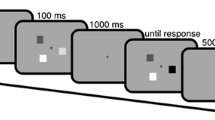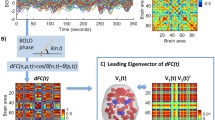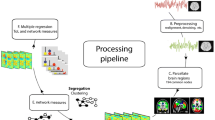Abstract
Although resting-state fMRI studies support that human brain is topographically organized regarding localized and distributed processes, it is still unclear about the task-modulated cortical hierarchy in terms of distributed functional connectivity and localized timescales. To address, current study investigated the effect of cognitive load on cortical connectivity gradients and local timescales in the healthy brain using resting state fMRI as well as 1- and 2-back working memory task fMRI. The results demonstrated that (1) increased cognitive load was associated with lower principal gradient in transmodal cortices, higher principal gradient in primary cortices, decreased decay rate and reduced timescale variability; (2) global properties including gradient variability, timescale decay rate, timescale variability and network topology were all modulated by cognitive load, with timescale variability related to behavioral performance; and (3) at 2-back state, the timescale variability was indirectly and negatively linked with global network integration, which was mediated by gradient variability. In conclusion, current study provides novel evidence for load-modulated cortical connectivity gradients and local timescales during cognitive states, which could contribute to better understanding about cognitive load theory and brain disorders with cognitive dysfunction.






Similar content being viewed by others
Availability of data and materials
The data and code that support the findings of this study will be made available from the corresponding author upon reasonable request.
References
Baddeley A (2012) Working memory: theories, models, and controversies. Annu Rev Psychol 63:1–29. https://doi.org/10.1146/annurev-psych-120710-100422
Bassett DS, Sporns O (2017) Network neuroscience. Nat Neurosci 20(3):353–364. https://doi.org/10.1038/nn.4502
Baum GL, Ciric R, Roalf DR, Betzel RF, Moore TM, Shinohara RT, Kahn AE, Vandekar SN, Rupert PE, Quarmley M, Cook PA, Elliott MA, Ruparel K, Gur RE, Gur RC, Bassett DS, Satterthwaite TD (2017) Modular segregation of structural brain networks supports the development of executive function in youth. Current Biol CB 27(11):1561-1572.e8. https://doi.org/10.1016/j.cub.2017.04.051
Callaway E (2022) Can brain scans reveal behaviour? Bombshell study says not yet. Nature 603(7903):777–778
Christophel TB, Klink PC, Spitzer B, Roelfsema PR, Haynes JD (2017) The Distributed Nature of Working Memory. Trends Cogn Sci 21(2):111–124. https://doi.org/10.1016/j.tics.2016.12.007
Cohen JR, D’Esposito M (2016) The segregation and integration of distinct brain networks and their relationship to cognition. J Neurosci 36(48):12083–12094. https://doi.org/10.1523/JNEUROSCI.2965-15.2016
Coifman RR, Lafon S, Lee AB, Maggioni M, Nadler B, Warner F, Zucker SW (2005) Geometric diffusions as a tool for harmonic analysis and structure definition of data: diffusion maps. Proc Natl Acad Sci USA 102(21):7426–7431. https://doi.org/10.1073/pnas.0500334102
Cole MW, Bassett DS, Power JD, Braver TS, Petersen SE (2014) Intrinsic and task-evoked network architectures of the human brain. Neuron 83(1):238–251. https://doi.org/10.1016/j.neuron.2014.05.014
Cole MW, Ito T, Schultz D, Mill R, Chen R, Cocuzza C (2019) Task activations produce spurious but systematic inflation of task functional connectivity estimates. Neuroimage 189:1–18. https://doi.org/10.1016/j.neuroimage.2018.12.054
Cole MW, Reynolds JR, Power JD, Repovs G, Anticevic A, Braver TS (2013) Multi-task connectivity reveals flexible hubs for adaptive task control. Nat Neurosci 16(9):1348–1355. https://doi.org/10.1038/nn.3470
Cross N, Paquola C, Pomares FB, Perrault AA, Jegou A, Nguyen A, Aydin U, Bernhardt BC, Grova C, Dang-Vu TT (2021) Cortical gradients of functional connectivity are robust to state-dependent changes following sleep deprivation. Neuroimage 226:117547. https://doi.org/10.1016/j.neuroimage.2020.117547
Di X, Zhang H, Biswal BB (2020) Anterior cingulate cortex differently modulates frontoparietal functional connectivity between resting-state and working memory tasks. Hum Brain Mapp 41(7):1797–1805
Dong D, Yao D, Wang Y, Hong SJ, Genon S, Xin F, Jung K, He H, Chang X, Duan M, Bernhardt BC, Margulies DS, Sepulcre J, Eickhoff SB, Luo C (2021) Compressed sensorimotor-to-transmodal hierarchical organization in schizophrenia. Psychol Med. https://doi.org/10.1017/S0033291721002129
Duncan J, Schramm M, Thompson R, Dumontheil I (2012) Task rules, working memory, and fluid intelligence. Psychon Bull Rev 19(5):864–870. https://doi.org/10.3758/s13423-012-0225-y
Eriksson J, Vogel EK, Lansner A, Bergström F, Nyberg L (2015) Neurocognitive architecture of working memory. Neuron 88(1):33–46. https://doi.org/10.1016/j.neuron.2015.09.020
Eryilmaz H, Dowling KF, Hughes DE, Rodriguez-Thompson A, Tanner A, Huntington C, Coon WG, Roffman JL (2020) Working memory load-dependent changes in cortical network connectivity estimated by machine learning. Neuroimage 217:116895. https://doi.org/10.1016/j.neuroimage.2020.116895
Fair DA, Schlaggar BL, Cohen AL, Miezin FM, Dosenbach NU, Wenger KK, Fox MD, Snyder AZ, Raichle ME, Petersen SE (2007) A method for using blocked and event-related fMRI data to study ‘“resting state”’ functional connectivity. Neuroimage 35:396–405. https://doi.org/10.1016/j.neuroimage.2006.11.051
Felleman DJ, Van Essen DC (1991) Distributed hierarchical processing in the primate cerebral cortex. Cerebral cortex 1(1):1–47. https://doi.org/10.1093/cercor/1.1.1-a
Golesorkhi M, Gomez-Pilar J, Tumati S, Fraser M, Northoff G (2021) Temporal hierarchy of intrinsic neural timescales converges with spatial core-periphery organization. Commun Biol 4(1):277. https://doi.org/10.1038/s42003-021-01785-z
Gratton C, Laumann TO, Gordon EM, Adeyemo B, Petersen SE (2016) Evidence for two independent factors that modify brain networks to meet task goals. Cell Rep 17(5):1276–1288. https://doi.org/10.1016/j.celrep.2016.10.002
Gratton C, Laumann TO, Nielsen AN, Greene DJ, Gordon EM, Gilmore AW, Nelson SM, Coalson RS, Snyder AZ, Schlaggar BL, Dosenbach N, Petersen SE (2018) Functional brain networks are dominated by stable group and individual factors not cognitive or daily variation. Neuron 98(2):439-452.e5. https://doi.org/10.1016/j.neuron.2018.03.035
Guimerà R, Amaral LA (2005) Cartography of complex networks: modules and universal roles. J Stat Mech. https://doi.org/10.1088/1742-5468/2005/02/P02001
Harrison TL, Shipstead Z, Engle RW (2015) Why is working memory capacity related to matrix reasoning tasks? Mem Cognit 43(3):389–396. https://doi.org/10.3758/s13421-014-0473-3
Hong SJ, Vos de Wael R, Bethlehem R, Lariviere S, Paquola C, Valk SL, Milham MP, Di Martino A, Margulies DS, Smallwood J, Bernhardt BC (2019) Atypical functional connectome hierarchy in autism. Nat Commun 10(1):1022. https://doi.org/10.1038/s41467-019-08944-1
Huntenburg JM, Bazin PL, Margulies DS (2018) Large-scale gradients in human cortical organization. Trends Cogn Sci 22(1):21–31. https://doi.org/10.1016/j.tics.2017.11.002
Ito T, Hearne LJ, Cole MW (2020) A cortical hierarchy of localized and distributed processes revealed via dissociation of task activations, connectivity changes, and timescales. Neuroimage 221:117141. https://doi.org/10.1016/j.neuroimage.2020.117141
Ito T, Kulkarni KR, Schultz DH, Mill RD, Chen RH, Solomyak LI, Cole MW (2017) Cognitive task information is transferred between brain regions via resting-state network topology. Nat Commun 8(1):1027. https://doi.org/10.1038/s41467-017-01000-w
Jenkins AC (2019) Rethinking cognitive load: a default-mode network perspective. Trends Cogn Sci 23(7):531–533. https://doi.org/10.1016/j.tics.2019.04.008
Kitzbichler MG, Henson RN, Smith ML, Nathan PJ, Bullmore ET (2011) Cognitive effort drives workspace configuration of human brain functional networks. J Neurosci off J Soc Neurosci 31(22):8259–8270
Krienen FM, Yeo BT, Buckner RL (2014) Reconfigurable task-dependent functional coupling modes cluster around a core functional architecture. Phil Trans R Soc B Biol Sci 369(1653):20130526. https://doi.org/10.1098/rstb.2013.0526
Larivière S, Vos de Wael R, Hong SJ, Paquola C, Tavakol S, Lowe AJ, Schrader DV, Bernhardt BC (2020) Multiscale structure-function gradients in the neonatal connectome. Cereb Cortex 30(1):47–58. https://doi.org/10.1093/cercor/bhz069
Liang X, Zhao C, Jin X, Jiang Y, Yang L, Chen Y, Gong G (2021) Sex-related human brain asymmetry in hemispheric functional gradients. Neuroimage. https://doi.org/10.1016/j.neuroimage.2021.117761
Liang X, Zou Q, He Y, Yang Y (2016) Topologically reorganized connectivity architecture of default-mode, executive-control, and salience networks across working memory task loads. Cereb Cortex 26(4):1501–1511. https://doi.org/10.1093/cercor/bhu316
Lin SY, Lee CC, Chen YS, Kuo LW (2019) Investigation of functional brain network reconfiguration during vocal emotional processing using graph-theoretical analysis. Soc Cogn Affect Neurosci 14(5):529–538. https://doi.org/10.1093/scan/nsz025
Logothetis NK, Pauls J, Augath M, Trinath T, Oeltermann A (2001) Neurophysiological investigation of the basis of the fMRI signal. Nature 412(6843):150–157. https://doi.org/10.1038/35084005
Ma Y, Shaik MA, Kozberg MG, Kim SH, Portes JP, Timerman D, Hillman EM (2016) Resting-state hemodynamics are spatiotemporally coupled to synchronized and symmetric neural activity in excitatory neurons. Proc Natl Acad Sci USA 113(52):E8463–E8471. https://doi.org/10.1073/pnas.1525369113
Margulies DS, Ghosh SS, Goulas A, Falkiewicz M, Huntenburg JM, Langs G, Bezgin G, Eickhoff SB, Castellanos FX, Petrides M, Jefferies E, Smallwood J (2016) Situating the default-mode network along a principal gradient of macroscale cortical organization. Proc Natl Acad Sci USA 113(44):12574–12579. https://doi.org/10.1073/pnas.1608282113
Mesulam MM (1998) From sensation to cognition. Brain J Neurol 121(6):1013–1052. https://doi.org/10.1093/brain/121.6.1013
Miller EK, Lundqvist M, Bastos AM (2018) Working memory 2 0. Neuron 100(2):463–475. https://doi.org/10.1016/j.neuron.2018.09.023
Mill RD, Ito T, Cole MW (2017) From connectome to cognition: The search for mechanism in human functional brain networks. Neuroimage 160:124–139. https://doi.org/10.1016/j.neuroimage.2017.01.060
Murray JD, Bernacchia A, Freedman DJ, Romo R, Wallis JD, Cai X, Padoa-Schioppa C, Pasternak T, Seo H, Lee D, Wang XJ (2014) A hierarchy of timescales across primate cortex. Nat Neurosci 17(12):1661–1663. https://doi.org/10.1038/nn.3862
Murphy C, Wang HT, Konu D, Lowndes R, Margulies DS, Jefferies E, Smallwood J (2019) Modes of operation: A topographic neural gradient supporting stimulus dependent and independent cognition. Neuroimage 186:487–496. https://doi.org/10.1016/j.neuroimage.2018.11.009
Preacher KJ, Hayes AF (2008) Asymptotic and resampling strategies for assessing and comparing indirect effects in multiple mediator models. Behav Res Methods 40(3):879–891. https://doi.org/10.3758/brm.40.3.879
Raut RV, Snyder AZ, Raichle ME (2020) Hierarchical dynamics as a macroscopic organizing principle of the human brain. Proc Natl Acad Sci USA 117(34):20890–20897. https://doi.org/10.1073/pnas.2003383117
Repovš G, Barch DM (2012) Working memory related brain network connectivity in individuals with schizophrenia and their siblings. Front Hum Neurosci 6:137. https://doi.org/10.3389/fnhum.2012.00137
Rubinov M, Sporns O (2010) Complex network measures of brain connectivity: uses and interpretations. Neuroimage 52(3):1059–1069. https://doi.org/10.1016/j.neuroimage.2009.10.003
Satterthwaite TD, Wolf DH, Loughead J, Ruparel K, Elliott MA, Hakonarson H, Gur RC, Gur RE (2012) Impact of in-scanner head motion on multiple measures of functional connectivity: relevance for studies of neurodevelopment in youth. Neuroimage 60(1):623–632. https://doi.org/10.1016/j.neuroimage.2011.12.063
Schaefer A, Kong R, Gordon EM, Laumann TO, Zuo XN, Holmes AJ, Eickhoff SB, Yeo B (2018) Local–global parcellation of the human cerebral cortex from intrinsic functional connectivity MRI. Cereb Cortex 28(9):3095–3114. https://doi.org/10.1093/cercor/bhx179
Schultz DH, Cole MW (2016) Higher intelligence is associated with less task-related brain network reconfiguration. J Neurosci off J Soci Neurosci 36(33):8551–8561. https://doi.org/10.1523/JNEUROSCI.0358-16.2016
Shashidhara S, Mitchell DJ, Erez Y, Duncan J (2019) Progressive recruitment of the frontoparietal multiple-demand system with increased task complexity, time pressure, and reward. J Cogn Neurosci 31(11):1617–1630. https://doi.org/10.1162/jocn_a_01440
Soreq E, Leech R, Hampshire A (2019) Dynamic network coding of working-memory domains and working-memory processes. Nat Commun 10(1):936. https://doi.org/10.1038/s41467-019-08840-8
Sydnor VJ, Larsen B, Bassett DS, Alexander-Bloch A, Fair DA, Liston C, Mackey AP, Milham MP, Pines A, Roalf DR, Seidlitz J, Xu T, Raznahan A, Satterthwaite TD (2021) Neurodevelopment of the association cortices: Patterns, mechanisms, and implications for psychopathology. Neuron 109(18):2820–2846. https://doi.org/10.1016/j.neuron.2021.06.016
Taghia J, Cai W, Ryali S, Kochalka J, Nicholas J, Chen T, Menon V (2018) Uncovering hidden brain state dynamics that regulate performance and decision-making during cognition. Nat Commun 9(1):2505. https://doi.org/10.1038/s41467-018-04723-6
Unsworth N, Fukuda K, Awh E, Vogel EK (2014) Working memory and fluid intelligence: capacity, attention control, and secondary memory retrieval. Cogn Psychol 71:1–26. https://doi.org/10.1016/j.cogpsych.2014.01.003
Vatansever D, Menon DK, Stamatakis E (2017) Default mode contributions to automated information processing. Proc Natl Acad Sci USA 114(48):12821–12826. https://doi.org/10.1073/pnas.1710521114
Vos de Wael R, Benkarim O, Paquola C, Lariviere S, Royer J, Tavakol S, Xu T, Hong SJ, Langs G, Valk S, Misic B, Milham M, Margulies D, Smallwood J, Bernhardt BC (2020) Brainspace: a toolbox for the analysis of macroscale gradients in neuroimaging and connectomics datasets. Commun Biol 3(1):103. https://doi.org/10.1038/s42003-020-0794-7
Westphal AJ, Wang S, Rissman J (2017) Episodic memory retrieval benefits from a less modular brain network organization. J Neurosci off J Soc Neurosci 37(13):3523–3531. https://doi.org/10.1523/JNEUROSCI.2509-16.2017
Wallis JD (2018) Decoding cognitive processes from neural ensembles. Trends Cogn Sci 22(12):1091–1102. https://doi.org/10.1016/j.tics.2018.09.002
Wolff A, Berberian N, Golesorkhi M, Gomez-Pilar J, Zilio F, Northoff G (2022) Intrinsic neural timescales: temporal integration and segregation. Trends Cogn Sci 26(2):159–173. https://doi.org/10.1016/j.tics.2021.11.007
Xia M, Liu J, Mechelli A, Sun X, Ma Q, Wang X, Wei D, Chen Y, Liu B, Huang CC, Zheng Y, Wu Y, Chen T, Cheng Y, Xu X, Gong Q, Si T, Qiu S, Lin CP, Cheng J, He Y (2022) Connectome gradient dysfunction in major depression and its association with gene expression profiles and treatment outcomes. Mol Psychiatry. https://doi.org/10.1038/s41380-022-01519-5.Advanceonlinepublication
Zuo XN, Xu T, Milham MP (2019) Harnessing reliability for neuroscience research. Nat Hum Behav 3(8):768–771. https://doi.org/10.1038/s41562-019-0655-x
Funding
We thank all the participants of this study. This work was supported by the National Natural Science Foundation of China (NSFC) grant (No. 62171101 and No. 62071109).
Author information
Authors and Affiliations
Contributions
HZ: conceptualization, methodology, software, analysis, writing—original draft, writing—review and editing. RZ: analysis. XH: analysis. SG: methodology. DSM: writing—review. CM: conceptualization, methodology, analysis, writing—review and editing, and supervision. BBB: supervision and writing—review and editing.
Corresponding authors
Ethics declarations
Conflict of interest
The authors declare no conflict of interest.
Additional information
Publisher's Note
Springer Nature remains neutral with regard to jurisdictional claims in published maps and institutional affiliations.
Rights and permissions
Springer Nature or its licensor holds exclusive rights to this article under a publishing agreement with the author(s) or other rightsholder(s); author self-archiving of the accepted manuscript version of this article is solely governed by the terms of such publishing agreement and applicable law.
About this article
Cite this article
Zhang, H., Zhao, R., Hu, X. et al. Cortical connectivity gradients and local timescales during cognitive states are modulated by cognitive loads. Brain Struct Funct 227, 2701–2712 (2022). https://doi.org/10.1007/s00429-022-02564-0
Received:
Accepted:
Published:
Issue Date:
DOI: https://doi.org/10.1007/s00429-022-02564-0




